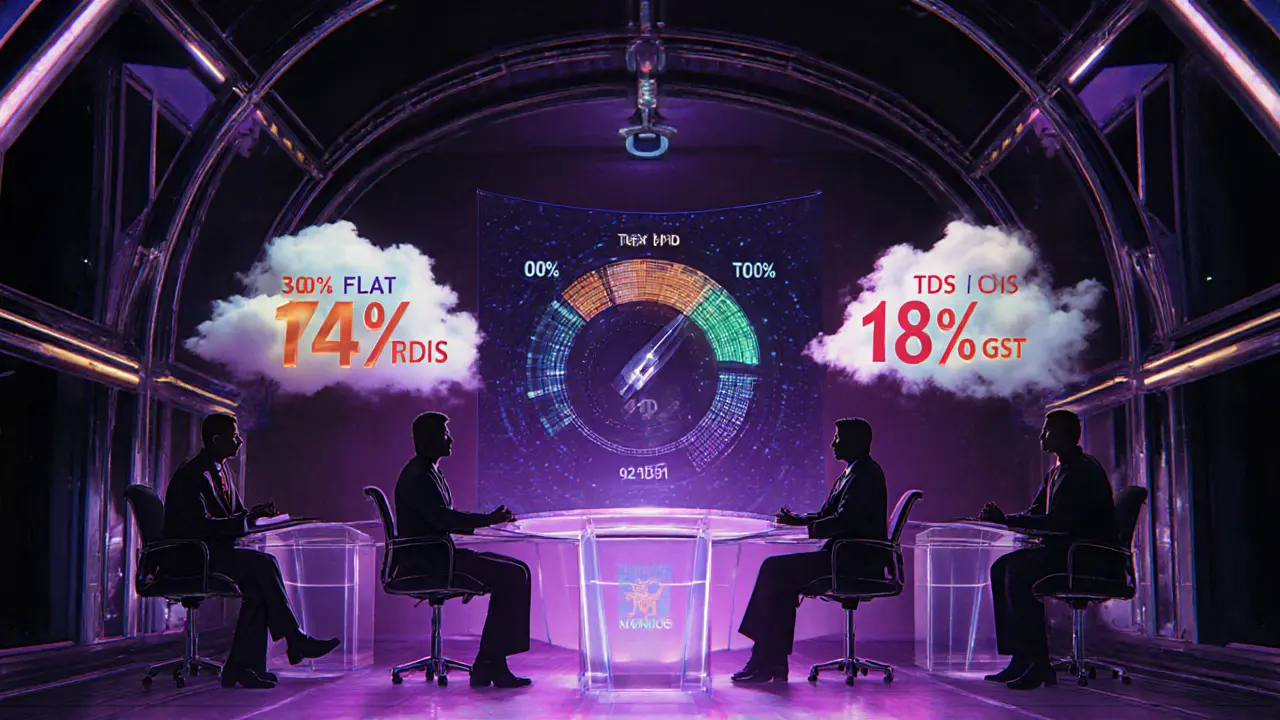India Crypto Tax Calculator
Tax Details
India taxes cryptocurrency gains at a flat 30%, with an additional 1% TDS on trades over ₹50,000 and 18% GST on platform services.
Your Tax Breakdown
Gross Profit: ₹0.00
30% Income Tax: ₹0.00
1% TDS (if applicable): ₹0.00
18% GST on Platform Fee: ₹0.00
Total Tax Liability: ₹0.00
When you look at the global crypto scene, India is a paradox: it tops adoption charts while imposing one of the world’s toughest tax regimes on digital assets. The country treats cryptocurrencies as Virtual Digital Assets (VDAs) under the Income Tax Act, yet traders face a flat 30% tax, a 1% Tax Deducted at Source (TDS) on every transaction over ₹50,000, and an 18% Goods and Services Tax (GST) on platform fees. How does a market thrive under such pressure? Below we break down the forces that keep India at the #1 spot, what the tax rules actually look like, and what the future might hold for Indian crypto enthusiasts.
What Makes India the Top Crypto Adoption Hub?
Several data points paint a clear picture of India’s momentum:
- Over 10 million active crypto wallets were reported in early 2025, a figure that dwarfs most other large economies.
- Daily trading volume on Indian exchanges regularly breaches $5billion, keeping the country in the top three globally.
- Young demographics - more than 65% of users are under 35 - fuel a culture of digital experimentation.
- Broad smartphone penetration (over 75% of adults) makes on‑the‑go trading a everyday habit.
The surge is not driven by government encouragement; it’s a grassroots movement powered by tech‑savvy millennials, a booming fintech startup scene, and a curiosity that outpaces regulatory friction.
India’s Crypto Tax Framework - A Quick Rundown
The tax code treats crypto gains like lottery winnings. Here’s what traders face:
- Flat 30% tax on all gains - no distinction between short‑term and long‑term capital gains.
- No loss set‑off - losses from one crypto can’t offset profits from another, nor can they be carried forward.
- 1% TDS on every transaction above ₹50,000 - exchanges automatically deduct this amount, regardless of profit or loss.
- Effective July2025, an 18% GST on all platform services - trading fees, staking, custody, even withdrawals are taxed.
The Central Board of Direct Taxes (CBDT) administers income tax, while the Financial Intelligence Unit - India (FIU‑IND) handles AML compliance, and the Reserve Bank of India (RBI) monitors systemic risk. All three bodies intersect on crypto regulation, creating a layered compliance landscape.

How Traders Manage the Tax Burden
Indian users have built a set of work‑arounds to keep their businesses viable:
- Offshore exchanges - many move a portion of volume to platforms outside India to avoid TDS and GST.
- Batching trades - traders group multiple small orders into a single transaction just under the ₹50,000 threshold.
- Expense tracking - although the law disallows most deductions, meticulous record‑keeping helps prove cost basis and avoid double taxation.
- Tax consultancy services - a growing niche of specialists offers compliance packages that automate Schedule VDA reporting.
These tactics illustrate why the market stays active: the profit potential still outweighs the tax hit for many participants.
Comparison: India vs. Other Crypto‑Friendly Jurisdictions
| Country | Adoption Rank | Tax on Gains | Loss Set‑off | Additional Levies |
|---|---|---|---|---|
| India | 1 | 30% flat | None | 1% TDS, 18% GST |
| United States | 2 | 15‑20% long‑term, up to 37% short‑term | Allowed | No TDS, sales tax varies |
| Germany | 4 | 0% if held >1yr, else personal income tax | Allowed | No extra levies |
| Singapore | 5 | 0% capital gains | Allowed | No GST on crypto services (as of 2025) |
| Nigeria | 3 | 20% flat | None | 2% TDS on large trades |
Even with the steepest tax rate, India’s adoption rank stays ahead of countries with lighter tax burdens, underscoring the strength of its user base.
Regulatory Pulse: Is Change on the Horizon?
In August2025 the CBDT launched a nationwide consultation inviting exchanges, traders, and fintech firms to weigh in on the tax model. Key questions on the table include:
- Should the 1% TDS be reduced or eliminated?
- Can a tiered capital‑gain structure replace the flat 30% rate?
- Is a unified crypto‑specific legislation needed to streamline AML, GST, and income‑tax rules?
Early feedback points to a growing consensus that the current regime is pushing volume offshore. If the government softens the tax load, India could retain even more of its native trading activity and attract international crypto firms looking for a large, tech‑savvy market.

What the Future Means for Everyday Traders
Regardless of policy shifts, Indian crypto participants should keep a few practical steps on their radar:
- Stay compliant - file Schedule VDA accurately; missing or inaccurate disclosures can trigger audits.
- Maintain a detailed ledger - capture purchase price, transaction dates, fees, and TDS deductions.
- Watch for policy updates - the CBDT’s consultation results are expected by early 2026.
- Consider diversification - spreading activity across domestic and vetted offshore platforms can mitigate tax exposure.
- Engage a tax professional - the interplay of income tax, TDS, and GST is complex and mistakes are costly.
By treating crypto as a serious investment class rather than a hobby, traders can turn tax pressure into a predictable cost of doing business.
Key Takeaways
- India leads global crypto adoption despite a 30% flat tax, 1% TDS, and 18% GST.
- Regulatory bodies - CBDT, FIU‑IND, and RBI - create a multi‑layered compliance environment.
- Traders employ offshore venues, batch trades, and specialized tax services to stay profitable.
- Comparative data shows India outpaces more tax‑friendly nations thanks to sheer user numbers.
- Ongoing CBDT consultations could reshape the tax framework, potentially easing the burden.
Frequently Asked Questions
How does India define cryptocurrency for tax purposes?
Under Section2(47A) of the Income Tax Act, crypto assets are classified as Virtual Digital Assets (VDAs). This definition includes coins, tokens, and NFTs, and it subjects any profit from their sale to income‑tax rules.
Can I claim transaction fees as an expense?
No. The current law only allows the cost of acquisition as a deductible amount. Fees, staking rewards, and mining costs cannot reduce the taxable gain.
What is the 1% TDS and how is it applied?
For every trade that exceeds ₹50,000, the exchange must withhold 1% of the transaction amount as Tax Deducted at Source. The amount is credited against your final tax liability but is collected upfront, even if the trade ends in a loss.
Will the upcoming CBDT consultation reduce the tax rates?
It’s too early to say. The consultation is gathering industry feedback on the 30% flat rate, the 1% TDS, and the 18% GST. Any change would need to pass through the Finance Ministry and Parliament, so expect a timeline that stretches into 2026.
Is it legal to use offshore crypto exchanges while residing in India?
Yes, Indians can hold accounts on foreign exchanges, but all profits must still be reported in Schedule VDA and subjected to the 30% tax plus any applicable TDS on Indian‑sourced transactions.


Helen Fitzgerald
October 10, 2025 AT 08:20Hey everyone, great rundown on India’s crypto scene! 🎉 It’s wild how the community pushes through the tax maze and still thrives. If you’re just getting started, keep tracking every trade in a spreadsheet – it saves a ton of headaches later. Also, consider using a crypto‑friendly wallet that logs fees automatically. The key is staying disciplined and not letting the tax burden scare you off. Keep the momentum, stay curious, and remember the market rewards the resilient.
mark noopa
October 10, 2025 AT 13:53Wow, this piece really dives deep, huh? 🤔 The whole 30% flat tax feels like a cosmic punishment, like the universe is saying "pay up or disappear" 🌌. And then there's that 1% TDS – it's like the tax man is constantly watching, never letting you breathe. Honestly, it's a paradox: massive adoption despite massive hurdles. It's as if the traders have a secret pact with destiny, sacrificing profits for the thrill of the game. But hey, maybe that's why the crypto culture is so addictive – the stakes are always high, and the rewards feel even sweeter when you finally break through that tax wall.
Rama Julianto
October 10, 2025 AT 19:26Look, the data is crystal clear – India’s numbers are insane and the tax rules are a nightmare. 30% flat on every gain? That’s brutal. No loss set‑off makes it even worse. People are hustling by moving to offshore exchanges, batching trades, and basically gaming the system. If you think it’ll stop, think again – the market is too hungry for profit. So either the govt eases up or we’ll see a massive outflow soon. Stop whining and start adapting, that's the only way to survive.
Leynda Jeane Erwin
October 11, 2025 AT 01:00Dear fellow readers, as I peruse this thorough exposition, I find myself compelled to interject a rather formal observation concerning the regulatory intricacies posited herein. Nevertheless, one might also simply say the tax stuff is crazy. Anyway, the adoption numbers are impressive, yet the fiscal impositions could be construed as excessively onerous. In sum, kudos for the analysis; however, one must also remain cognizant of the pragmatic realities facing traders.
Brandon Salemi
October 11, 2025 AT 06:33Honestly, the crypto buzz in India is like a roller‑coaster – thrilling, terrifying, and you never know when the next loop is coming. The tax guys are the real-life villains here, but the community’s grit shines through.
Siddharth Murugesan
October 11, 2025 AT 12:06this is just another example of how the gov always finds new ways to suck the life out of innovators. they think a 30% tax will kill the market, but it will just push everything underground where it's even harder to regulate. reality check: people will always find a way.
Ethan Chambers
October 11, 2025 AT 17:40One cannot help but marvel at the sheer paradoxical elegance of India's crypto phenomenon – a veritable ballet of ambition pirouetting atop a tax regime that would make even the most seasoned fiscal purist wince in dismay. To begin with, the 30% flat levy, devoid of any nuanced distinction between short‑ and long‑term gains, functions not merely as a punitive measure but as a stark illustration of legislative myopia in the face of technological evolution. One might argue, albeit with a touch of contrarian flair, that such a monolithic tax rate could act as a crucible, forging a breed of traders hardened by adversity, much like the alchemists of old who pursued gold amidst fire. Yet, the additional 1% TDS on transactions surpassing ₹50,000 introduces a relentless drip‑feed of revenue to the exchequer, compelling traders to meticulously dissect each trade, turning what should be a fluid market into a bureaucratic maze. Moreover, the 18% GST on platform fees is an unprecedented imposition on a sector traditionally exempt from such consumption taxes, effectively treating digital asset services as tangible goods. This conflation betrays a fundamental misunderstanding of the intangible nature of blockchain‑facilitated value transfer. Consequently, the collective impact of these levies engenders a climate where the path to profitability is littered with fiscal landmines, demanding an arsenal of sophisticated tax‑planning stratagems.
Nevertheless, the indomitable spirit of India's youthful demographic cannot be understated. Over 65% of participants reside beneath the age of 35, a statistic that underscores a generational willingness to experiment, to embrace volatility, and to subvert conventional financial paradigms. Their proclivity for mobile technology, with smartphone penetration eclipsing 75%, serves as the conduit through which decentralized finance permeates daily life. This grassroots dynamism operates independently of governmental endorsement, suggesting that the market's resilience may, in fact, be its most potent lever for future reform. As the CBDT's consultation process unfolds, one must ponder whether a calibrated reduction in the tax burden could metamorphose India from a reluctant participant to a global exemplar of crypto-friendly regulation. In the interim, traders continue to employ offshore exchanges, batch trading techniques, and specialized tax consultancy services to mitigate the fiscal drag.
In summation, the paradox of India's crypto ascendancy amidst onerous taxation is a testament to both the market's latent potential and the regulatory inertia that threatens to stifle it. Should policymakers elect to heed the clarion call of the community, the nation stands poised to not only retain its preeminence but also to attract a wave of international crypto enterprises seeking a vibrant, tech‑savvy audience. Absent such reforms, however, the exodus to more hospitable jurisdictions may accelerate, depriving India of both innovation and tax revenue in the long run. The stakes are unequivocally high, and the next chapter will be written by whichever side – regulators or traders – can navigate this labyrinth with greater agility.
gayle Smith
October 11, 2025 AT 23:13Let’s dissect the macro‑economic implications of crypto adoption in India with a lexicon that would make any seasoned analyst nod in reverent awe. Leveraging blockchain as a disruptive catalyst, the nation is effectively reconfiguring its monetary velocity, thereby engendering a paradigmatic shift in capital allocation frameworks. The interplay between decentralized finance protocols and traditional banking infrastructures manifests as a synergistic convergence, catalyzing liquidity infusion across tier‑2 markets. Moreover, the kinetic energy derived from the demographic dividend – a youthful cohort with a proclivity for digital native engagement – compounds the network effects that underpin sustained adoption trajectories.
Jade Hibbert
October 12, 2025 AT 04:46Sure, taxes are a pain-but hey, at least the market’s still booming.
Anjali Govind
October 12, 2025 AT 10:20Hey folks, loving the vibe here – it’s clear that the community is supporting each other through the tax maze. I think it’s crucial we keep sharing tools and best practices, like simple spreadsheet templates for tracking TDS and GST. Also, remember that staying compliant is not just about avoiding penalties; it builds credibility for the whole ecosystem. Keep the conversation going and let’s help each other grow.
Sanjay Lago
October 12, 2025 AT 15:53Super encouraging to see all this energy! Just a heads‑up: while offshore exchanges help dodge some fees, you still need to report any gains back home. I always tell my peers to keep a clean ledger – it saves a lot of stress when tax season rolls around. Also, keep an eye on the upcoming CBDT consultation – any softening could be a game‑changer.
arnab nath
October 12, 2025 AT 21:26Everyone’s missing the hidden agenda – the government wants to keep crypto under tight surveillance. The 1% TDS is just a data collection tool, not a revenue source.
ചഞ്ചൽ അനസൂയ
October 13, 2025 AT 03:00Friends, it’s amazing how resilience builds character. When faced with heavy taxes, we can either crumble or innovate. I’ve seen traders turn these challenges into opportunities by learning tax law basics and even mentoring newcomers. Let’s keep the supportive spirit alive and share knowledge, not just profits.
Orlando Lucas
October 13, 2025 AT 08:33Reflecting on the broader philosophical implications, one might say that the tension between regulation and innovation mirrors humanity’s age‑old struggle between order and chaos. The 30% flat tax could be viewed as a societal attempt to impose order upon a rapidly evolving financial frontier. Yet, the innate curiosity of individuals drives them to explore the unknown, often finding creative pathways around constraints. In this context, the surge of crypto adoption in India becomes a case study in how collective desire for autonomy can reshape institutional frameworks. It invites us to contemplate whether true progress emerges from compromise or from bold defiance of the status quo. Ultimately, the future will be written by those who balance pragmatism with visionary ambition.
Philip Smart
October 13, 2025 AT 14:06Honestly, this whole tax thing is just a hassle. People will find a way or they won’t, but I’m not impressed with the over‑analysis.
Jacob Moore
October 13, 2025 AT 19:40Anyone looking for a quick tip: automate your transaction logs with a simple Python script. It’ll spit out your profit, tax, and GST numbers instantly. Saves you hours each month and keeps everything tidy for the authorities.
Manas Patil
October 14, 2025 AT 01:13From a cultural standpoint, India’s crypto surge is a fascinating blend of traditional risk‑averse attitudes and modern digital enthusiasm. The jargon around DeFi, staking, and NFTs is now part of everyday conversation among youths. This linguistic shift signifies deeper societal integration of blockchain technologies, which could eventually influence policy if the narrative continues to grow.